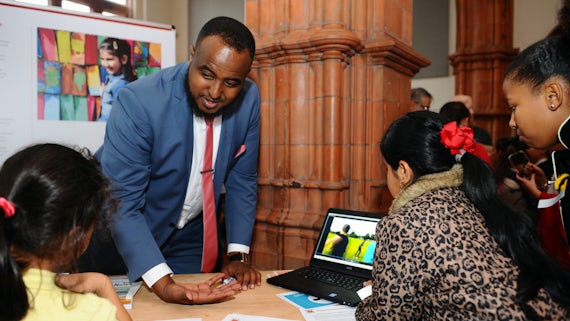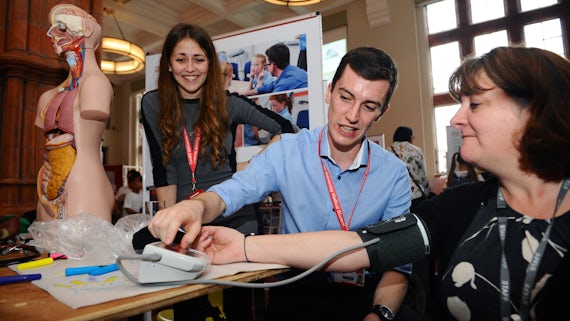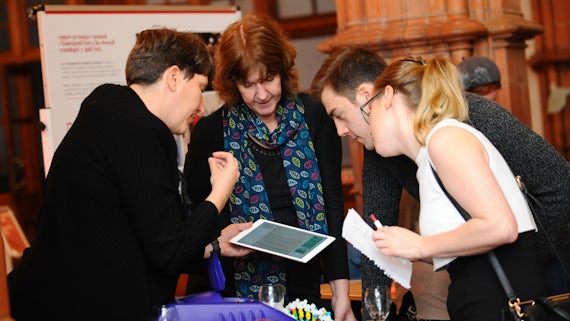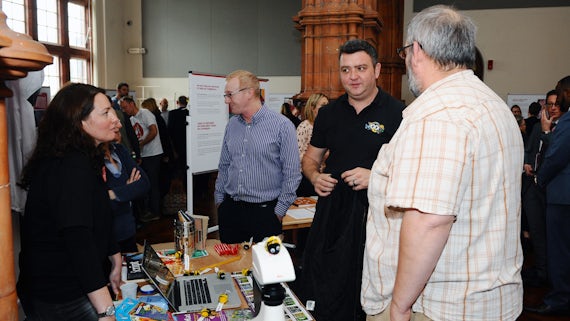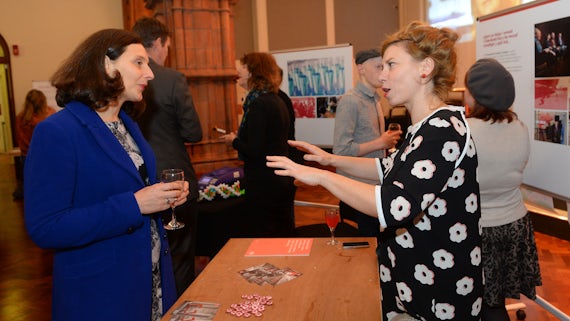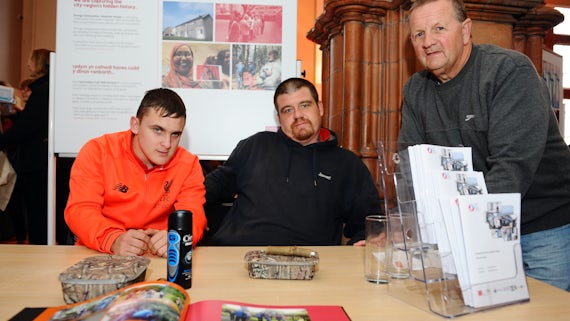Partnering for Change showcase
In November 2016 City Region Exchange hosted an exhibition of projects being undertaken by staff and students from across the University with partners in the region.
Regional engagement is an important facet of the University’s social and economic obligations. Two years after the launch of our Transforming Communities programme, this showcase celebrated the breadth of innovative projects already underway, and underlined our commitment to further developing partnerships for teaching- and research-based engagement across the Capital Region.
Visitors from local authorities, Welsh Government, third sector organisations and the private sector had the opportunity to get hands on with project exhibits, meet the staff and students responsible, hear stories of the positive impacts on those involved, and share their views on future opportunities for Cardiff University to engage with our region.
Members of the public were also welcomed to the event, and included a contingent of 40 pupils from Mount Stuart School, keen to learn the winners of the School of Pharmacy's Best Bee Garden drawing competition! Winners in the juniors section were Mrunmayee Mogarkar (1st), Maryam Idris (2nd) and Larissa Radka (3rd). In the infants section, the winning drawings were created by Shareen Yasar (1st), Aliya Al-Muttialib (2nd) and Joyce Chen (3rd).
Meanwhile geocachers from the Strong Communities, Healthier People project's "Trek to Connect" initiative led a short geocaching exercise around Cardiff Bay, giving participants a taste of how they combine learning about the region's industrial heritage with exercise.
Themes
The exhibition, held in the spectacular surroundings of Cardiff Bay's Pierhead Building, showcased just seventeen of the University's many and varied regional engagement activities, across five themes:
The Welsh Wound Innovation Centre is placing the city-region at the heart of wound care innovation. Drawing on patients’ insights, it is making direct improvements to wound care in our region, and it is working closely with businesses, the NHS and Welsh Government to encourage business start-ups and inward investment.
Students from the School of Medicine are using interactive health workshops to introduce pupils in areas of social deprivation to healthy living principles. In 2016, more than 1000 children from primary schools in the city-region have had hands-on experience with models and activities that teach them about the inner workings of the human body.
Based on research undertaken by the Children’s Burns Research Centre, the Safe-Tea Campaign aims to reduce the incidence and severity of hot drink scalds among pre-school children. Novel approaches – including use of thermal imaging footage, demonstrations and group discussions – are being trialled with parents in Flying Start areas of Cardiff. This trial is now being assessed to determine the feasibility of delivering a more wide-reaching campaign.
Thanks to the School of Biosciences’ PCR Loan Box scheme, schools in our region have access to real-life research applications for the techniques they are teaching. The scheme gives pupils the opportunity to generate millions of copies of specific DNA sequences, and to learn directly from research staff and students about the important applications of this technique.
Through the Royal Society of Chemistry’s Spectroscopy in a Suitcase programme for 14-18 year olds, the School of Chemistry provides hands-on experience with equipment normally available only in a lab setting. In 2015/16 the School delivered workshops to 1500 pupils in our region, helping them to more fully understand the theories they are learning.
Dawnsio’r Lingo (Dance the Lingo), a collaboration with POSSIB: Voices In Art, Menter Iaith Merthyr Tudful and 3Gs Development Trust, has seen pupils in six city-region primary schools use dance and movement to engage with Welsh as a second language. Initial evaluation shows that this innovative approach is improving pupils’ retention of Welsh words.
The REACH project is helping young people in Butetown, Riverside and Grangetown to develop the skills, knowledge and confidence needed to access and thrive in further education. As part of a new, community-based approach to widening participation, the young people themselves are taking an active role in designing the support services they need.
Researchers from the School of Pharmacy and Pharmaceutical Sciences, in partnership with colleagues from the University’s Community Gateway, are working with schools and community groups to establish bee-friendly urban green spaces. At the same time as learning about the importance of bees and biodiversity, participants are helping researchers in their ongoing search for plant-derived antibiotics. Search YouTube for “Cardiff bee-friendly city” to find out more.
Community members in Grangetown are taking part in a pilot initiative that will see them engaging in “environmental crowdsensing”. Armed with the tools and techniques needed to measure urban heat islands, air and water quality, acoustics, health and wellbeing, place-based identity and more, these community researchers are enabling us to better understand the benefits of urban green spaces.
As a gateway to the University, the Commercial Development team provides businesses from across the region with opportunities – from Knowledge Transfer Partnerships to participation in Innovation Network events – to work with our staff and students, and to develop professional networks.
The National Software Academy is helping to meet industry need for qualified software engineers, ensuring that students benefit from access to leading-edge commercial tools and techniques, and interact extensively with industry professionals.
Y Lab, the Public Services Innovation Lab for Wales, is a partnership with innovation charity Nesta. Researchers and innovation experts have come together with policy-makers and practitioners to test solutions to major societal challenges.
The Creative Cardiff Network connects creative organisations and individuals throughout the city-region. The Network has rapidly established itself as a valued resource, and its members are generating new conversations that enhance and promote our region’s creative economy.
Global in its reach, the Centre for Community Journalism remains committed to local communities across our city-region – like those of Grangetown, the Rhondda and Merthyr Tydfil, where limited provision of local news risks creation of a democratic deficit.
Strong Communities, Healthier People is connecting Communities First areas in Merthyr Tydfil and Cardiff with their unique histories and cultures, and with one another. Through development of geocaching trails, participants are revealing the region’s heritage, while developing new skills and improving their wellbeing. This project forms part of the Welsh Government’s Pioneer Area programme, which aims to tackle poverty through culture.
The CAER Heritage Project, an award-winning partnership with Action in Caerau and Ely, puts local people at the heart of cutting-edge archaeological research. Cardiff University historians and archaeologists are supporting schools and community members to actively explore the untold history of their area. Through its Young People Opportunities Project, CAER Heritage also supports Strong Communities, Healthier People’s geocaching activities.
Community Gateway is building long-term partnerships with communities in Grangetown, helping them to make it an even better place. Since 2014, 38 projects have focused on themes from mental health to urban greening, and included events from philosophy cafés to a safety week. Community Gateway is currently working with its partners to establish Grange Bowls Pavilion as a permanent hub for community activity.
